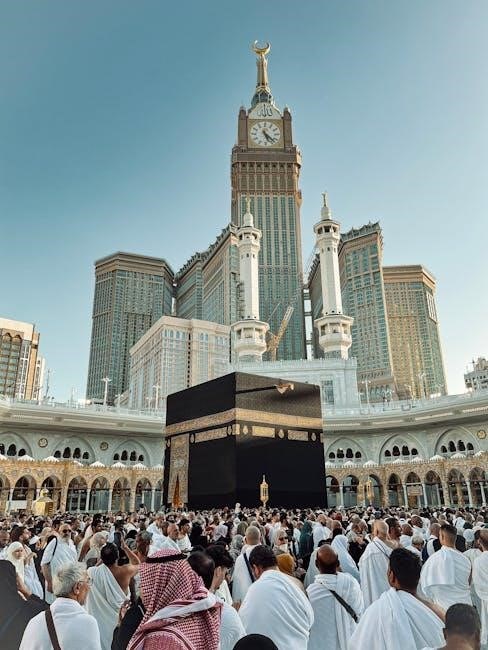
umrah dua pdf
Umrah, a sacred Islamic pilgrimage, offers a profound spiritual journey․ Duas, heartfelt supplications, play a vital role in enhancing the experience․ This guide provides comprehensive rituals, essential supplications, and insights to help prepare and perform Umrah effectively, ensuring a meaningful and fulfilling experience for all pilgrims․
1․1 What is Umrah?
Umrah, often referred to as the “minor pilgrimage,” is a sacred Islamic ritual performed in Makkah․ It involves four essential practices: wearing Ihram before reaching Miqat, performing two rakahs of Salah, making specific supplications, and avoiding prohibited acts like hunting or cutting nails․ Umrah is a voluntary act of worship that offers spiritual rejuvenation and a deeper connection with Allah․ It is a source of immense blessings and a means to seek forgiveness, guidance, and provision․ Unlike Hajj, Umrah can be performed at any time of the year․ Pilgrims are encouraged to prepare with sincerity, adhering to the Sunnah and recommended Duas․ This sacred journey is a powerful opportunity for self-reflection, spiritual growth, and strengthening one’s faith, making it a cherished experience for Muslims worldwide․
1․2 Importance of Duas in Umrah
Duas are a vital component of Umrah, serving as a direct means of communication with Allah․ These supplications are not just rituals but heartfelt expressions of devotion, seeking mercy, forgiveness, and guidance․ The act of making Duas during Umrah is highly encouraged, as it is considered a time when prayers are more likely to be accepted․ Specific Duas are recommended during key moments, such as while wearing Ihram, performing Tawaf, and walking between Safa and Marwah․ These supplications are drawn from the Quran and Hadith, ensuring their authenticity and spiritual significance․ Making Duas during Umrah is a powerful way to seek healing, clarity, and provision, as well as to strengthen one’s spiritual connection․ Pilgrims are advised to prepare a list of Duas in advance, understanding their meanings to enhance the sincerity of their supplications․ This practice enriches the Umrah experience, making it a deeply fulfilling act of worship․
1․3 Structure of the Article
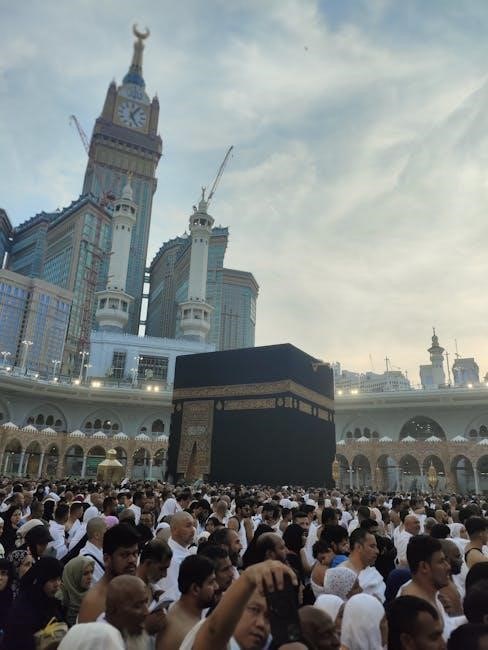
Significance of Duas in Umrah
Duas in Umrah hold immense spiritual significance, serving as a direct conversation with Allah․ They amplify the pilgrim’s devotion, seeking forgiveness, guidance, and blessings, making the pilgrimage more meaningful and impactful․
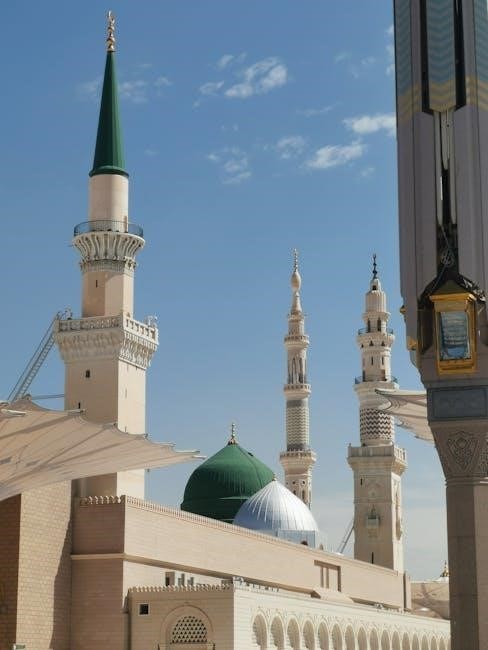
2․1 Role of Duas in Umrah Rituals
Duas play a central role in Umrah rituals, serving as a means of connecting with Allah throughout the pilgrimage․ From the moment of donning Ihram to completing the final rites, specific supplications are recommended to enhance the spiritual experience․ These prayers are not just random requests but are deeply rooted in the Sunnah and Quranic teachings․ During Tawaf, Sai, and even the stoning of the Jamarat, Duas are integral, helping pilgrims express gratitude, seek forgiveness, and request guidance․ Many of these supplications are derived from the Prophet Muhammad’s (peace be upon him) practices, making them a cornerstone of Umrah․ By incorporating these Duas, pilgrims ensure their rituals are performed with the right intention and devotion, maximizing the spiritual benefits of their journey․ Umrah Dua PDFs often compile these prayers, making it easier for pilgrims to follow and recite them correctly during each step of their pilgrimage․
2․2 Best Times to Make Duas During Umrah
Identifying the best times to make Duas during Umrah is crucial for maximizing the spiritual benefits of the pilgrimage․ Key moments include when donning Ihram, as this signifies a state of purity and devotion․ Additionally, during Tawaf, particularly after completing the first three circuits, pilgrims are encouraged to raise their hands in supplication․ The time between the Asr and Maghrib prayers is also considered highly auspicious for making Duas․ Many Umrah Dua PDFs highlight these optimal times, ensuring pilgrims can align their supplications with moments of heightened spiritual significance․ By prioritizing these intervals, pilgrims can enhance their connection with Allah and seek His mercy and blessings more effectively․ Remembering these recommended times helps pilgrims make the most of their Umrah experience, fostering a deeper sense of mindfulness and devotion throughout their journey․
2․3 Duas for Forgiveness and Mercy
Duas for forgiveness and mercy hold a central place in the Umrah pilgrimage, as seeking Allah’s pardon is a fundamental aspect of this sacred journey․ One of the most recommended supplications is recited upon entering the Haram in Makkah: “Allahumma antas-salam, wa minkas-salam․ Tabarakta ya dhal-jalali wal-ikram” (O Allah, You are the Source of Peace, and from You comes peace․ Blessed are You, O Possessor of Majesty and Honor)․ Pilgrims also recite “Rabbighfir warham wa Anta Khairur Rahimoon” (O Lord, forgive and have mercy, and You are the Best of the Merciful) during Tawaf and Sai․ These Duas emphasize humility and the desire for divine forgiveness․ Umrah Dua PDFs often highlight these supplications, encouraging pilgrims to focus on seeking Allah’s mercy throughout their journey․ By consistently reciting these prayers, pilgrims can deepen their spiritual connection and return home with a cleansed heart, seeking Allah’s eternal grace and compassion․
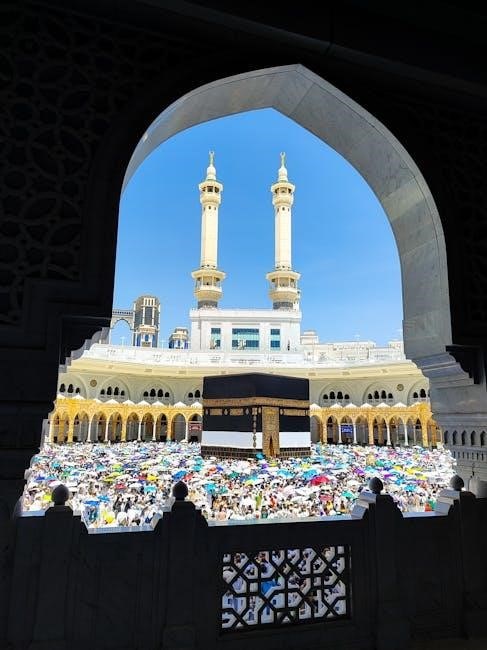
Preparation for Umrah
Preparation for Umrah involves spiritual readiness through consistent Dua, physical health, and understanding rituals․ Umrah Dua PDFs provide essential supplications and guidelines, ensuring pilgrims are well-prepared mentally and spiritually․
3․1 Spiritual Preparation
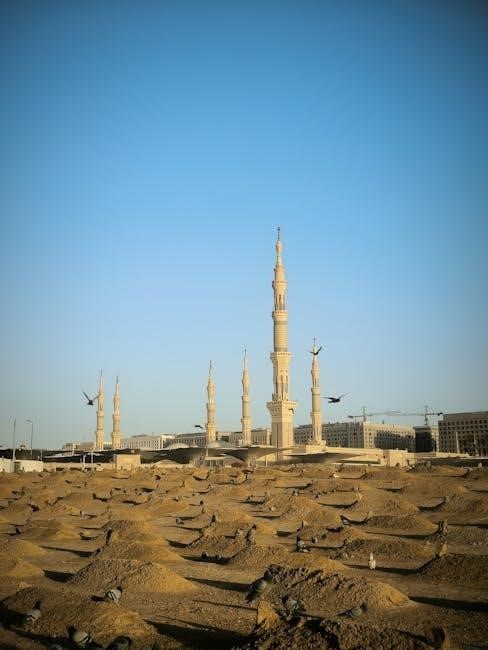
Spiritual preparation for Umrah is vital, involving consistent prayer, Quran recitation, and seeking forgiveness․ Pilgrims should focus on building a strong connection with Allah, reflecting on their intentions, and purifying their hearts․ Umrah Dua PDFs offer guided supplications to enhance this preparation, providing specific prayers for seeking guidance, strength, and blessings․ These resources help pilgrims stay focused on the spiritual aspects of the journey, ensuring their actions align with Islamic teachings․ Regular remembrance of Allah (Dhikr) and repentance (Tawbah) are essential to cultivate humility and gratitude․ By spiritually preparing, pilgrims can approach Umrah with a sincere and mindful heart, maximizing the spiritual benefits of this sacred journey․
3․2 Physical Preparation
Physical preparation for Umrah is essential to ensure a comfortable and fulfilling journey․ Pilgrims should maintain good health, build stamina, and avoid exhaustion․ It is recommended to engage in light exercise and eat nutritious meals before traveling․ Wearing comfortable and modest clothing, including the ihram garments, is crucial․ Essential items like prayer mats, water bottles, and sunscreen should be packed․ Umrah Dua PDFs often include checklists and practical tips for physical preparation, helping pilgrims stay organized․ Additionally, arranging travel documents, such as visas and tickets, in advance is vital․ By prioritizing physical readiness, pilgrims can focus on the spiritual aspects of Umrah without unnecessary distractions․ Proper preparation ensures a smooth and enriching experience, allowing devotees to fulfill their rituals with ease and devotion․
3․3 Essential Duas for Travel
Essential duas for travel are vital for pilgrims embarking on their Umrah journey․ These supplications ensure safety, blessings, and spiritual focus․ The Prophet Muhammad (peace be upon him) taught specific prayers for travelers, such as the dua upon leaving home: “Allahumma inni as-aluka khayra as-safar wa khayra al-mandal” (O Allah, I ask You for the good of this journey and the good of what I will encounter)․ Another recommended dua is “Rabb ighfir warham wa anta khayru ar-Rahimin” (Lord, forgive and have mercy, for You are the Best of the Merciful)․ Umrah Dua PDFs often compile these prayers, making them easily accessible․ Reciting these duas helps pilgrims seek Allah’s protection, guidance, and grace throughout their travel․ By memorizing and reciting these supplications, travelers can enhance their spiritual experience and remain connected to Allah during their journey to the holy sites․
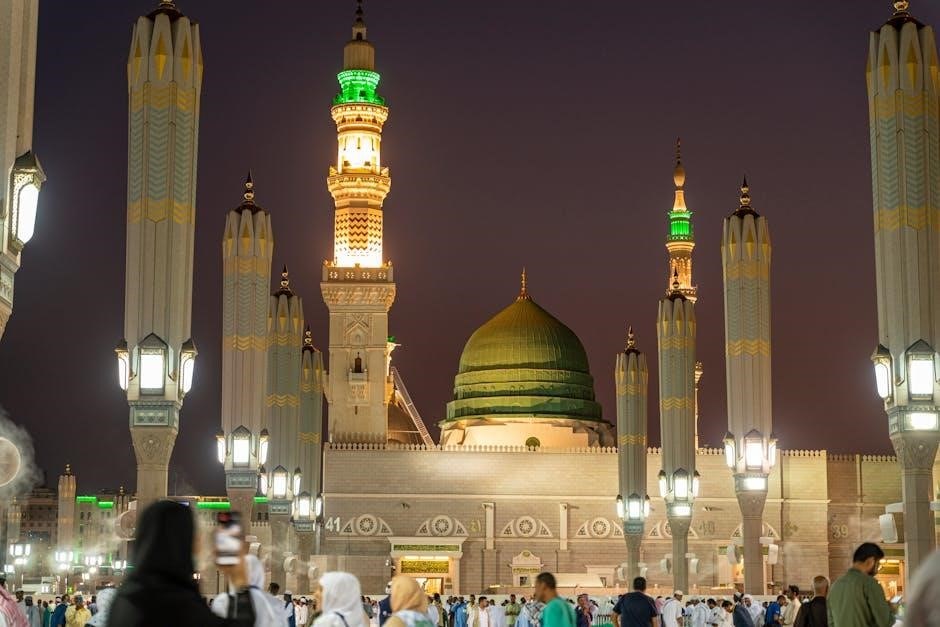
Duas During Ihram and Miqat
Duas during Ihram and Miqat are crucial for pilgrims․ Upon wearing Ihram, recite Allahumma labbayk and seek refuge in Allah․ At Miqat, supplicate for acceptance and mercy, ensuring a blessed Umrah journey․
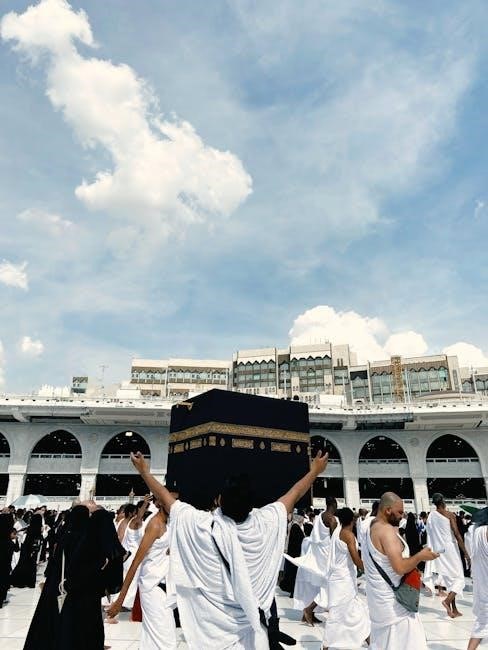
4․1 Duas Upon Wearing Ihram
Wearing Ihram is a sacred moment, marking the start of the Umrah journey․ Pilgrims are encouraged to recite specific duas, such as Labbaik Allāhumma Labbaik (Here I am, O Allah, here I am), expressing submission to Allah․ Additional supplications include seeking forgiveness, mercy, and guidance․ Reciting Allāhumma innī as’aluka safhatan tanzīhā wa dīnān khādimā (O Allah, I ask You for a purified and dedicated faith) is also recommended․ These duas reflect the pilgrim’s intention to purify their heart and seek blessings․ Ensuring the correct recitation of these supplications is vital, as they set the tone for the spiritual journey ahead․ These specific duas are often included in Umrah PDF guides for easy reference, ensuring pilgrims can recite them with accuracy and sincerity․
4․2 Duas at Miqat
Upon reaching Miqat, pilgrims should recite specific duas to mark the beginning of their sacred journey․ It is recommended to invoke blessings and seek forgiveness at this point․ A common dua is Allāhumma innī hadaytu wada’u arba‘ati ash’ari lil Umrah (O Allah, I have presented myself and shed my first blood for Umrah)․ Another supplication is Allāhumma ij’alhu ‘āliyan shāfi’an wa murtazān (O Allah, make it noble, beneficial, and accepted)․ These prayers are essential for setting a sincere intention and seeking divine acceptance․ Additionally, reciting Surah Al-Ikhlas and Surah Al-Falaq is encouraged for protection and purity․ Remembering these duas is facilitated by Umrah PDF guides, which compile them for easy access․ Ensuring their recitation with a pure heart enhances the spiritual experience of Miqat․
4․3 Supplications While in Ihram
While in the state of Ihram, pilgrims are encouraged to engage in continuous supplication, as this sacred state is considered a time of heightened spirituality․ A recommended dua is Allāhumma laka labbaika, wa masha’iya ilayka wata’atiq (O Allah, I respond to Your call, and I obey Your commands)․ Another supplication is Rabbighfir warham wa anta khayrur rāhimīn (O Lord, forgive and have mercy, for You are the best of the merciful)․ Pilgrims should also recite Subhānallahi walhamdulillāhi wallahu akbar (Glory be to Allah, praise be to Allah, and Allah is the greatest) frequently․ It is advised to remain mindful of Allah’s presence and seek His guidance․ Umrah PDF guides often include these supplications, making it easier for pilgrims to remember and recite them sincerely during their journey․ Consistent supplication while in Ihram strengthens the spiritual connection and enhances the Umrah experience․
Tawaf and Sai Duas
Tawaf and Sai are vital Umrah rituals where specific duas enhance spiritual connection․ Pilgrims often use Umrah dua PDF guides to access these supplications easily during their pilgrimage․
5․1 Duas During Tawaf
Tawaf, the circumambulation of the Kaaba, is a central ritual in Umrah․ Specific duas are recommended to enhance the spirituality of this act․ The Umrah dua PDF guides include supplications like the Prophet’s (PBUH) prayer: “O Allah, grant us beneficial knowledge, righteous deeds, and sincere repentance․” Pilgrims are encouraged to recite the Quran, glorify Allah, and seek forgiveness․ One notable dua is, “O Allah, I beg of You, Your mercy and forgiveness․” These supplications are deeply rooted in Islamic tradition and are often highlighted in Umrah dua PDF resources․ Reciting them with focus and sincerity is believed to strengthen one’s faith and draw closer to Allah․ The PDF guides also emphasize the importance of maintaining humility and devotion during Tawaf, ensuring that the ritual is performed with the utmost respect and mindfulness․
5․2 Specific Duas for Each Circuit
During Tawaf, each circuit around the Kaaba holds unique significance, and specific duas are recommended for each․ The first circuit is often dedicated to praising Allah and seeking His mercy․ A common dua is, “O Allah, grant us safety, faith, and certainty․” In the second circuit, supplications focus on seeking guidance, such as, “O Allah, make us among those who are rightly guided․” The third circuit is ideal for asking for forgiveness, with the dua, “O Allah, forgive us and have mercy upon us․” These specific supplications, outlined in Umrah dua PDFs, help pilgrims connect deeply with the ritual․ The PDF guides provide a comprehensive list of duas for each circuit, ensuring pilgrims can recite them with ease and devotion․ This structured approach enhances the spiritual experience of Tawaf, making it more meaningful and fulfilling․
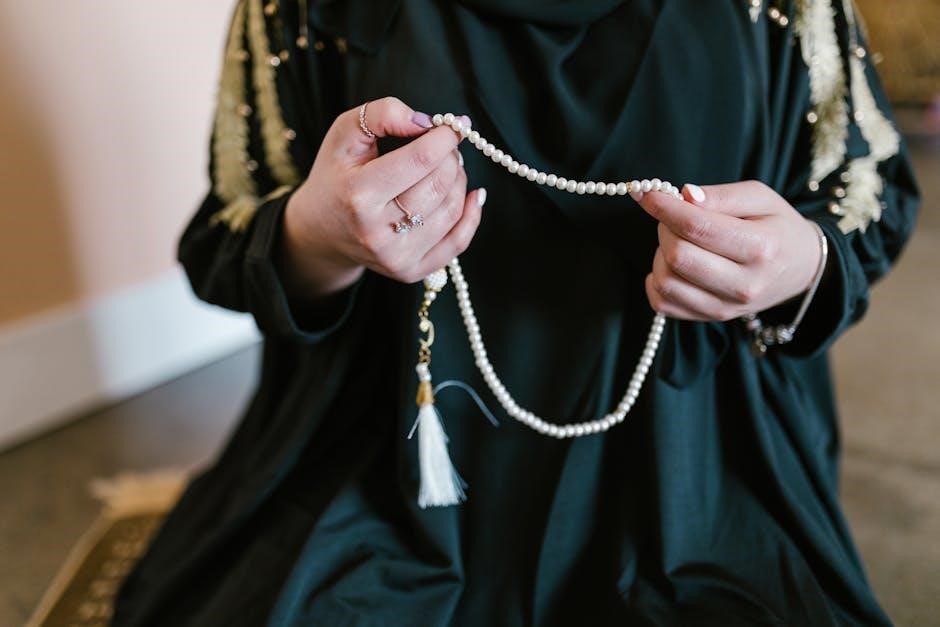
5․3 Duas During Sai Between Safa and Marwah
Sai, the act of running or walking between the hills of Safa and Marwah, is a vital part of Umrah․ This ritual commemorates Hajar’s search for water for her son Ismail․ During Sai, specific duas are recommended to enhance the spiritual experience․ Pilgrims are encouraged to recite the Quran, glorify Allah, and make heartfelt supplications․ A popular dua is, “O Allah, grant us refuge from sickness and grant us safety․” Another recommended supplication is, “O Allah, I ask You for forgiveness and health, and I ask You for Your mercy and contentment․” Umrah dua PDFs provide detailed supplications for each segment of Sai, ensuring pilgrims can recite them with ease․ These guides emphasize the importance of sincerity and focus during this ritual, making it a deeply rewarding experience․ The structured supplications in PDF resources help pilgrims align their intentions with the sacred act of Sai․
Common Mistakes to Avoid
Many pilgrims make errors during Umrah, such as forgetting to recite specific duas, not maintaining focus, or neglecting proper etiquette․ These mistakes can detract from the spiritual experience․
6․1 Mistakes in Duas
During Umrah, many pilgrims make errors in their duas, such as forgetting specific supplications or reciting them without proper focus․ Common mistakes include rushing through duas, not facing the Kaaba, or neglecting recommended timings․ Some pilgrims may also use incorrect or incomplete Dua recitations․ To avoid these errors, it is essential to use reliable Umrah Dua PDFs, which provide accurate supplications and proper methods․ Additionally, maintaining concentration and understanding the meaning of the duas can enhance their effectiveness․ By being mindful of these common pitfalls, pilgrims can ensure their supplications are performed correctly and meaningfully, maximizing the spiritual benefits of their Umrah journey․
6․2 Mistakes During Tawaf
During Tawaf, pilgrims often make mistakes that can affect the validity or spirituality of the ritual․ Common errors include not completing the required seven circuits, failing to maintain the correct direction, or improperly facing the Kaaba․ Some individuals may also forget to recite specific supplications or perform the Tawaf too quickly, lacking focus․ Additionally, mistakes such as crossing the Hijr Ismail area incorrectly or failing to keep the Kaaba on the left side can occur․ It is also important to avoid distractions and ensure the Tawaf is performed with proper etiquette, such as not raising the voice during supplications․ Using a reliable Umrah Dua PDF guide can help pilgrims avoid these mistakes and perform Tawaf with greater precision and devotion․
6․3 Mistakes During Sai
During the Sai ritual between Safa and Marwah, pilgrims often make mistakes that can diminish the spirituality of the act․ Common errors include not completing the required seven circuits, starting or ending at incorrect points, or failing to maintain the proper pace․ Some individuals may forget to recite the recommended supplications or neglect to face the Kaaba when making specific du’as․ Additionally, mistakes such as not maintaining the state of Ihram correctly or failing to cover the awrah properly can occur․ It is also important to avoid rushing through Sai without proper focus or intention․ Using a trusted Umrah Dua PDF guide can help pilgrims avoid these pitfalls and ensure they perform Sai with the correct etiquette and mindfulness, enhancing their spiritual experience․
Duas for Specific Needs
This section provides du’as for specific needs, such as healing, clarity, guidance, provision, and success, helping pilgrims address personal concerns during Umrah․ Use an Umrah Dua PDF for reference․
7․1 Duas for Healing
Duas for healing are essential during Umrah, as they seek Allah’s mercy and recovery from ailments․ Pilgrims often recite specific prayers like Rabbishafi Anta or As’aluka for health․ These du’as, found in Umrah Dua PDFs, emphasize trust in Allah’s power to heal․ Many perform these supplications at sacred sites like the Kaaba or Zamzam well, believing in their blessings․ Healing du’as are not only for physical ailments but also for emotional and spiritual well-being․ They remind believers to rely on Allah’s grace and seek His forgiveness․ Using a PDF guide helps pilgrims memorize and recite these du’as correctly, ensuring their intentions are pure and their supplications heartfelt․ These prayers strengthen faith and provide comfort, aligning with the spiritual goals of Umrah․ By incorporating healing du’as, pilgrims can deepen their connection with Allah and seek His divine mercy․
7․2 Duas for Clarity and Guidance
Duas for clarity and guidance are vital during Umrah, helping pilgrims seek Allah’s direction in life․ These supplications are often recited to gain wisdom, resolve confusion, and strengthen faith․ A popular du’a is: “Allahumma yassir lana amrina, waftah lana abwaba rahmatika, wa anzkilna minash-sharril ‘azim․” This prayer asks Allah to simplify tasks, open doors of mercy, and protect from harm․ Umrah Dua PDFs provide such supplications, ensuring pilgrims can recite them with accuracy․ Many of these du’as are derived from the Quran and Sunnah, emphasizing their authenticity․ For instance, the du’a from Surah Ar-Room, verses 22-24, highlights the importance of seeking divine guidance․ Pilgrims often recite these du’as during Tawaf or while walking between Safa and Marwah, seeking clarity in their decisions and lives․ These supplications foster a deeper connection with Allah, helping pilgrims navigate life’s challenges with confidence and faith․
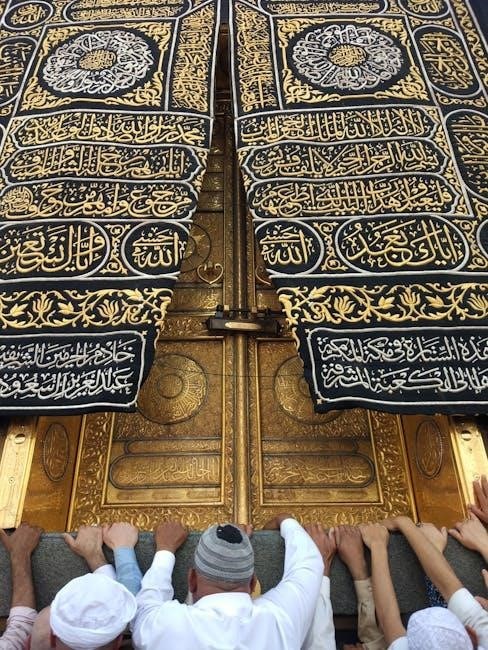
7․3 Duas for Provision and Success
Duas for provision and success are essential for seeking Allah’s blessings in livelihood and achievements․ Pilgrims often recite these supplications to ask for sustenance, wealth, and prosperity; A recommended du’a is: “Rabbana âti’na min rahmatika wa hayyi lana min amrina rashada․” This prayer requests Allah to grant wisdom and guide one’s efforts toward success․ Umrah Dua PDFs include such supplications, ensuring pilgrims can invoke them correctly․ Another du’a from the Quran, found in Surah Al-Furqan (25:2), emphasizes asking for increase in knowledge and provision․ These prayers are often recited during Tawaf or while performing Sai, seeking Allah’s grace for a better life․ By incorporating these du’as, pilgrims express gratitude and trust in Allah’s plan, believing He will provide and guide them toward success in both worldly and spiritual matters․ These supplications strengthen faith and reliance on divine providence․

PDF Resources and Guides
Discover comprehensive Umrah Dua PDF guides, offering organized supplications and rituals for a focused pilgrimage experience․ These resources provide easy digital access to essential prayers and guidance, benefiting all pilgrims․
8․1 Recommended Umrah and Dua PDFs
Several highly recommended Umrah and Dua PDFs are available to guide pilgrims through their spiritual journey․ Titles like Essential Duas for Umrah, Umrah Step-by-Step Guide, and Duas of the Prophet (pbuh) During Umrah are popular choices․ These resources provide comprehensive supplications, rituals, and meanings, helping pilgrims connect deeply with their worship․ Many PDFs include Arabic scripts, English translations, and transliterations, catering to diverse audiences․ They also cover specific prayers for each stage of Umrah, such as Ihram, Tawaf, and Sai․ Some PDFs incorporate reflections and tips for maximizing the spiritual benefits of the pilgrimage․ These guides are easily accessible online and can be downloaded for offline use, ensuring convenience for travelers․ They are invaluable for both first-time pilgrims and seasoned worshippers seeking to enhance their Umrah experience․
8․2 How to Download and Use PDF Guides
To download Umrah and Dua PDF guides, visit reputable Islamic websites, forums, or app stores․ Many platforms offer free resources, such as Duas for Umrah or Umrah Guide with Supplications․ Once downloaded, these PDFs can be saved on smartphones, tablets, or laptops for easy access․ Use a PDF reader app to navigate the content, and consider bookmarking important sections like specific Duas or rituals․ For offline use, ensure the file is fully downloaded before traveling․ Print copies are also an option for those who prefer physical notes․ These guides are designed to be user-friendly, making it easy to follow along during the pilgrimage․
Organize the PDFs in a dedicated folder on your device for quick reference․ Some guides include indexes or tables of contents, allowing you to locate specific Duas or rituals quickly․ Carry a charger or power bank to keep your devices powered throughout your journey․ By utilizing these resources thoughtfully, pilgrims can enhance their Umrah experience and stay focused on their worship․
8․3 Benefits of Using PDF Resources
Using PDF resources for Umrah and Dua offers numerous benefits, enhancing the pilgrimage experience․ These guides are portable, allowing pilgrims to carry a wealth of information on their devices․ They are easily accessible offline, which is crucial in areas with limited internet connectivity․ PDFs often include organized content, such as indexed sections for specific Duas, rituals, and timelines, making navigation simple․ Users can customize their experience by bookmarking or highlighting important pages․ Additionally, PDFs are cost-effective and environmentally friendly compared to printed materials․ They also enable sharing among fellow pilgrims, fostering a sense of community․ Many PDFs are regularly updated, ensuring the latest guidance and interpretations are available․ This convenience allows pilgrims to focus on their worship without unnecessary distractions․
Moreover, PDF resources often include additional features like prayer timings, maps, and translation aids, making them invaluable companions during Umrah․ They provide privacy, as personal notes or reflections can be added digitally․ This format also supports multiple devices, ensuring accessibility across smartphones, tablets, and laptops․ Ultimately, PDF guides empower pilgrims to prepare thoroughly and perform their rituals with confidence and clarity․